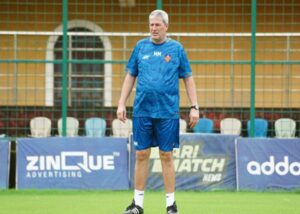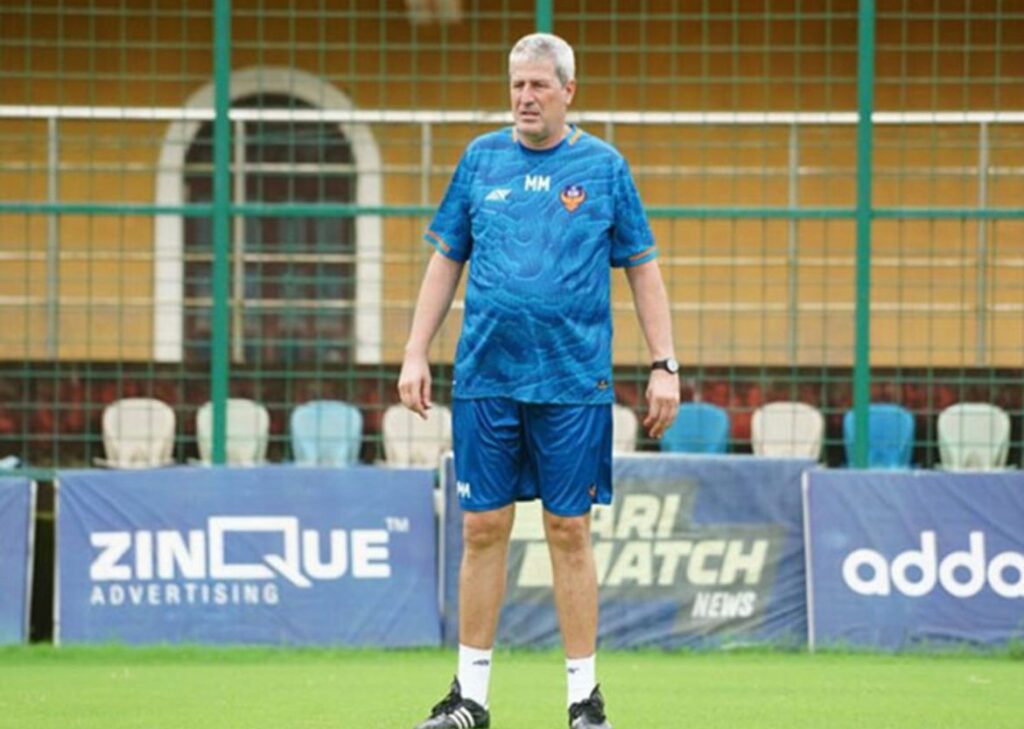
“My feeling is that Indian players are very comfortable. Life is very good for them in the ISL, and it is difficult for them to try and go abroad. You will grow when you play abroad. I am not speaking about the top level, Premier League or La Liga. But if you go abroad and play against opponents who are better than you, you will improve.”
This is not just RevSportz’s view. These are the words of Manolo Marquez, the Spaniard who has taken over from Igor Stimac as coach of India’s men’s national football team. At 55, the Barcelona-born Marquez is no spring chicken. He has played and worked at various levels of Spanish football, which has produced players of matchless technical ability for a few decades now. His words carry the weight of someone who has seen first-hand how the world’s finest football system works.
What he has said is hardly revolutionary either. Whichever walk of life we talk about, individuals better themselves only when they leave their comfort zones. If Japan and South Korea sit at the apex of Asian football now, it’s partly because of the pioneers from nearly half a century ago.
Yasuhiko Okudera spent nine years in West Germany between 1977 and 1986, with FC Koln, Hertha Berlin and Werder Bremen. Cha Bum-kun, his South Korean counterpart, played for Eintracht Frankfurt and Bayer Leverkusen in the same era. Kazu Miura, still playing in Japan’s lower leagues at the age of 57, honed his skills in Brazil in the late 1980s.
Hidetoshi Nakata played for AS Roma at a time when Italy still boasted the world’s strongest league. Park Ji-sung was a key player in perhaps Sir Alex Ferguson’s greatest Manchester United squad.
So, why haven’t more Indian players cracked the overseas code? Is it just that they lack skill? Or are the cultural barriers too high? At the time Okudera took his chance in Europe, Indian football’s profile was no less than that of Japan. As for the language barrier, it’s well-documented that the Japanese, Chinese and Koreans struggle far more with English and other European languages than Indians.
Food is also no longer an issue. You’ll barely find a town in western Europe that doesn’t have the ubiquitous Indian/Bangladeshi restaurant.
At the heart of the matter, as is so often the case in life, is money. If you look at the Asian Football Confederation (AFC) club competitions’ ranking, India are ranked a lowly 17th. But when it comes to average salaries paid out in each league, the ISL is easily in the top 10. Some estimates even place it in the top six.
Clearly, because of a lack of genuine quality, the few players that make it are being paid far above what their performances merit. Just to put things into perspective, Liverpool’s Conor Bradley, the right-back from Northern Ireland, is on a base salary of $520,000. That’s a little less than Rupees 4.5 crores.
Bradley plays for the club that have been Manchester City’s only consistent challengers in the Pep Guardiola era. So assured were his displays last season – including a fabulous goal against Chelsea – that Liverpool stopped searching for a back-up for Trent Alexander-Arnold. This season, Bradley will play in the revamped UEFA Champions League. That there are Indian players earning a similar salary in the ISL is laughable.
In other sporting news:
🚨The Vinesh Phogat case has been extended to 16 August at 6 pm Paris time.
Every minor detail is being checked into as CAS has not jumped to a conclusion. Are we heading towards a positive verdict in favour of India?@RohanDC98 & @TrishaGhosal from Paris@AgeasFederal… pic.twitter.com/YFfIYq2CCt
— RevSportz Global (@RevSportzGlobal) August 14, 2024
Marquez referenced the Premier League and La Liga. But the brutal reality is that not a single Indian player right now is even good enough to play in England’s Championship – the second tier. Not even a handful are good enough to get trials with League One sides. If they did move abroad, like Okudera and Cha in the 1970s, the best they could expect would be a contract with some third-tier club in western Europe. They would be paid around 250,000 pounds a year at best (approximately 2.7 crores), with no guarantees about playing time.
But, however hard Marquez tries with these players, Indian football will continue to paddle in the shallows until it finds its Okudera or Cha. It’s going to take one individual to bite the bullet and endure the hardships in a tough league before the glass ceiling is shattered. We know that Bhaichung Bhutia, Sunil Chhetri and goalkeeper Gurpreet Singh Sandhu spent time with European clubs. But that was not enough to make an impact. Who will that pioneer be?
For more sports content: https://revsportz.in/




